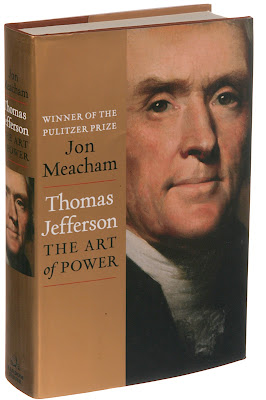Book in Review: "Thomas Jefferson Art of Power"
 Thomas Jefferson has always struck me as an interesting American figure. He was the author of the Declaration, the architect of Monticello, and the third President of the United States. But despite the indelible imprint he had left on this nation at so formative a period in American history, Jefferson has still remained largely a mystery to me.
Thomas Jefferson has always struck me as an interesting American figure. He was the author of the Declaration, the architect of Monticello, and the third President of the United States. But despite the indelible imprint he had left on this nation at so formative a period in American history, Jefferson has still remained largely a mystery to me.Jon Meacham’s biography Jefferson: Art of Power helped largely to uncover that mystery.
And the Jefferson that is revealed is both remarkable and complex. He is someone who was devoted to his ideals of democracy and liberty; someone who was quite optimistic about humanity as a whole and yet ever fearful of monarchy of the past resurrecting in New World from. He was an incredibly driven man, an actor and a mover: Never satisfied by the status quo—ever reforming his government and himself. In Jefferson we see a blend of the idealist and the pragmatist. He was a man of romantic vision, yet he never hesitated to move forward when something less than that vision was available to him. An expert politician, Jefferson perfected the art of executing his will from a distance, or from less than direct means. He detested arguments. He was less than a gifted public speaker. Yet his use of the pen and personal conversations could move mountains—and they often did.
In Art of Power Meacham dives brilliantly into the lifelong struggle Jefferson waged against England and its various representations in the United States. He discusses the decades-long Hamilton/Jefferson clash and the outcome thereof. Meacham goes in detail to describe Jefferson’s governorship, his term as Secretary of State, and his eight year Presidency of the United States—in which he doubled the size of the nation and kept America from war.
But Meacham does not shy away from the contradictions. Jefferson was opposed in theory to the idea of slavery, and yet his masterful political skill was never used to seek a solution. He believed that there could be no “interracial state” and yet he kept many slaves in harmony at Monticello, even fathering several children through his slave Sally Hemmings. For this Meacham addresses with sensibility: Harshly, but not measuring a historical figure entirely by the standards of today.
Art of Power is by many respects what a biography is supposed to be. At just about 500 pages, Meacham finds an appropriate balance between detail and summary in his writing. He does not get too far into the weeds to distract the reader from the whole, nor does he gloss over some of the more arduous but essential particulars. Meacham’s prose is also enjoyable to read, and will satisfy even the most uninformed readers (like myself).
But perhaps the most impressive aspect of Art of Power is the wealth of direct quotations (whether in speeches, correspondence, or personal records) that permeate the biography. This does two things: 1) It gives the reader a real image of Jefferson as told by Jefferson. 2) It keeps the author from tarnishing that image with his own hunches, opinions, or agenda. Meacham does a great job of keeping his voice in narration relatively small, and letting Jefferson speak for himself—which should be every biographer’s goal.



Comments
Post a Comment